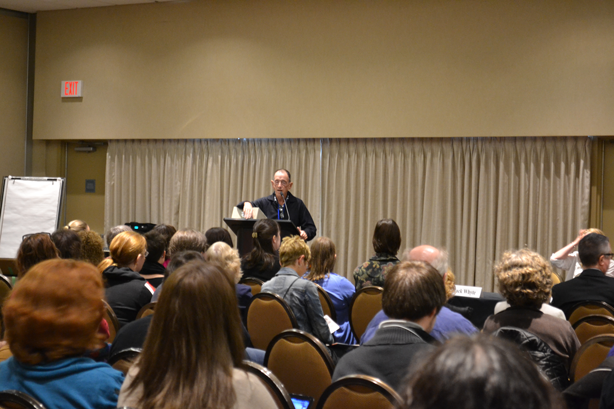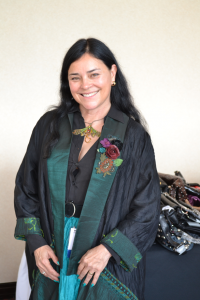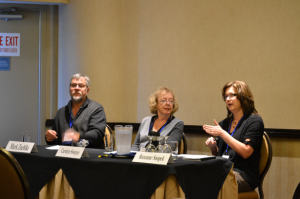By Ashley Mussbacher and Valerie Franklin (The Cascade/Contributor) – Email
Print Edition: October 30, 2013

You know people are passionate about writing when they discuss sentence structure in the bathroom.
If that sounds like your type of crowd, you’d fit right in at the Surrey International Writer’s Conference (SiWC). The 21st annual conference was held at the Sheraton Hotel last weekend, attended by hundreds of writers of all skill levels, ages, and walks of life.
[pullquote]
“I love meeting the writers and critiquing their work.”
– Michael Slade
[/pullquote]
SiWC isn’t about big names reading their work to large audiences. Instead, accomplished authors get together one-on-one with attendees to help them strengthen their writing skills and teach them how to navigate the industry.
This year’s impressive lineup of guest presenters included such authors as Diana Gabaldon, Michael Slade, kc dyer, Ivan Coyote, Hallie Ephron, and Susanna Kearsley, as well as many editors and literary agents. As part of the registration package, attendees are offered a blue pencil session where they sit down with one of these authors to have their writing style critiqued and improved. They also receive a pitch session with a literary agent – a real, tangible shot at getting published.
The conference runs like a well-oiled machine thanks to the 80 passionate volunteers who give their weekend to help out with the event. It’s easy to see why some of them have been coming back for 10 years.
The atmosphere is warm and welcoming, and there’s also an undercurrent of giddy excitement. Elated writers rush out of blue pencil sessions clutching their edited manuscripts, or line up for pitch sessions with nervous smiles. Before each meal, the latest “good news” stories from the pitch sessions are announced to the entire conference, celebrating the success of attendees who have had their writing picked up by agents.

But the real magic happens when attendees get the chance to connect with other writers. There’s no sense of ego, celebrity, or competition here. Authors and editors wander the hallways, happy to chat and offer their experience. Michael Slade, a bestselling suspense novelist and a born storyteller, sits with us on a sofa and regales us for a fascinating half-hour with the details of his best writing technique: living out the stories you want to write. He enjoys the conference just as much as the attendees do.
“I love meeting the writers and critiquing their work,” he says. “I love getting to know all the people who come here.”
For many writers, the workshops are the main attraction. With only a single morning to explore the conference, we can only sample a small selection of the dozens of Saturday workshops – but each one is packed with useful advice, fascinating stories, and hard-won pearls of industry wisdom.
In “Marketing Your Book and Traditional Self-Publishing,” well-known indie author Jodi McIsaac imparts the importance of having an online presence to market your book, not just social media pages or a blog.
“Every word in your blog is a word not in your book,” she warns.
[pullquote]
“I’ll give you Gabaldon’s three rules of writing. One: read. Read lots. Figure out why you like something, or why you don’t like it. It’ll help you figure out the tools of the craft. Two: write. Nothing will teach you to write except the act of putting words on the page. Three: don’t stop.”
– Diana Gabaldon
[/pullquote]
In “Staying Alive in Publishing,” writers Mark Zuehlke, Carolyn Swayze, and Roxanne Snopek discuss the pitfalls of the publishing industry. Times are hard for publishing houses, and Snopek tells the audience that she lost an enormous portion of the royalties from one of her books due to her publishers suddenly going bankrupt. Compared to McIsaac’s self-publishing workshop, which was crammed wall to wall with attendees, this workshop was almost empty – perhaps a sign that authors are moving away from depending on publishing businesses, wary of experiences like Snopek’s.
The next workshop, “Parallel Tracks: Managing Character,” is hosted by novelist Hallie Ephron. Audience members describe their fictional characters’ backstories and Ephron offers advice on how to strengthen them. A running joke soon emerges: in almost all of the audience’s stories, their characters’ parents have died tragic deaths.
Ephron also notes the importance of fleshing out a character with believable flaws.
“Every virtue has a combined flaw,” she says. “A brave character may also be impulsive. A smart character might overanalyze everything. Someone who’s fearful is also very careful.”
[pullquote]
“Ivan Coyote said I need to trust my gut on what I’m writing. If I think it’s good, it’s good. If I think it’s bad, then shut up and fix it. She validated my trust in myself.”
– Hayley Lavik
[/pullquote]
Next door in “Queries That Work”, editor Adrienne Kerr is teaching the audience how to catch an agent’s attention with a good pitch letter. One writer is struggling with hers. Several women in the audience put up their hands with suggestions, and within a few minutes the letter’s opening hook has become catchy and smooth. Kerr claps her hands together: “Don’t you love writer’s conferences? This is the best thing that could have happened!”
Finally it’s time for the famous (or infamous) SiWC Idol. It’s immediately clear that this workshop is the most popular. Attendees anonymously drop the first pages of their novels into a basket, and author Jack Whyte reads them aloud one by one in his deep Scottish accent. A panel of four literary agents raise their hands to stop the reading if they don’t like it – but if they let Whyte get to the bottom of the page, the writer may have just found an agent for their novel.

Miraculously, the first two writing samples make it past the panel. Jack Whyte is taken aback. “It’s extremely unusual to even get to the second paragraph,” he says, laughing. “That was something of an amazing start.”
The next few excerpts aren’t as lucky. The panel critiques them one by one: too descriptive, has no hook, lacks character development, unrealistic.
Finally another one passes the test. “That’s a great example of setting and pacing,” one of the agents says approvingly over the roar of applause. “Send that to me.”
Saturday mornings don’t get much more educational than this.
If you missed your chance to attend this year, don’t worry – they’re already planning next year’s conference. And with the wealth of industry wisdom, friendly atmosphere, and opportunities for success that SiWC offers, you can bet we’ll be back.
This interview has been edited for length and clarity.

